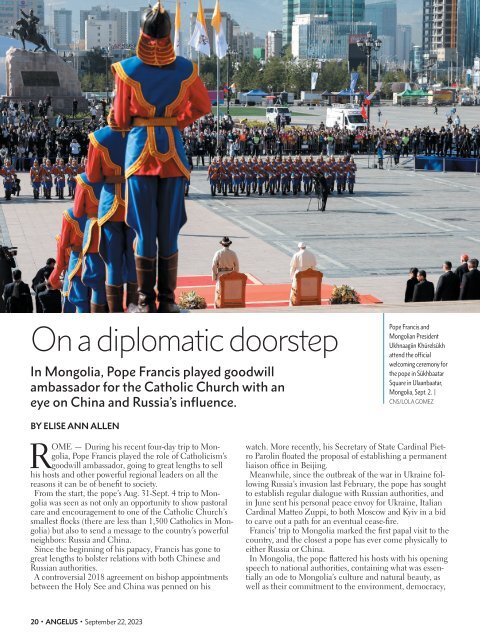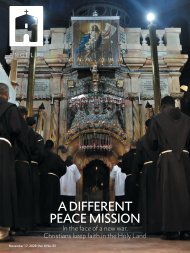Create successful ePaper yourself
Turn your PDF publications into a flip-book with our unique Google optimized e-Paper software.
On a diplomatic doorstep<br />
In Mongolia, Pope Francis played goodwill<br />
ambassador for the Catholic Church with an<br />
eye on China and Russia’s influence.<br />
BY ELISE ANN ALLEN<br />
ROME — During his recent four-day trip to Mongolia,<br />
Pope Francis played the role of Catholicism’s<br />
goodwill ambassador, going to great lengths to sell<br />
his hosts and other powerful regional leaders on all the<br />
reasons it can be of benefit to society.<br />
From the start, the pope’s Aug. 31-Sept. 4 trip to Mongolia<br />
was seen as not only an opportunity to show pastoral<br />
care and encouragement to one of the Catholic Church’s<br />
smallest flocks (there are less than 1,500 Catholics in Mongolia)<br />
but also to send a message to the country’s powerful<br />
neighbors: Russia and China.<br />
Since the beginning of his papacy, Francis has gone to<br />
great lengths to bolster relations with both Chinese and<br />
Russian authorities.<br />
A controversial 2018 agreement on bishop appointments<br />
between the Holy See and China was penned on his<br />
Pope Francis and<br />
Mongolian President<br />
Ukhnaagiin Khürelsükh<br />
attend the official<br />
welcoming ceremony for<br />
the pope in Sükhbaatar<br />
Square in Ulaanbaatar,<br />
Mongolia, Sept. 2. |<br />
CNS/LOLA GOMEZ<br />
watch. More recently, his Secretary of State Cardinal Pietro<br />
Parolin floated the proposal of establishing a permanent<br />
liaison office in Beijing.<br />
Meanwhile, since the outbreak of the war in Ukraine following<br />
Russia’s invasion last February, the pope has sought<br />
to establish regular dialogue with Russian authorities, and<br />
in June sent his personal peace envoy for Ukraine, Italian<br />
Cardinal Matteo Zuppi, to both Moscow and Kyiv in a bid<br />
to carve out a path for an eventual cease-fire.<br />
Francis’ trip to Mongolia marked the first papal visit to the<br />
country, and the closest a pope has ever come physically to<br />
either Russia or China.<br />
In Mongolia, the pope flattered his hosts with his opening<br />
speech to national authorities, containing what was essentially<br />
an ode to Mongolia’s culture and natural beauty, as<br />
well as their commitment to the environment, democracy,<br />
and religious freedom following the fall of Soviet Communism<br />
in <strong>19</strong>92.<br />
In a remark that seemed directed at the country’s Russian<br />
neighbors, he expressed hope that “the dark clouds of war<br />
be dispelled, swept away by the firm desire for a universal<br />
fraternity wherein tensions are resolved through encounter<br />
and dialogue.”<br />
He also repeatedly referenced the Church’s social and<br />
charitable initiatives as a reason why governments should<br />
not be afraid of the Church, offered a special greeting to<br />
the Chinese people, and hit back against criticism of his<br />
outreach to China and Russia.<br />
In a Sept. 3 address to missionaries and bishops, he stated<br />
that Jesus did not send his disciples “to spread political<br />
theories, but to bear witness by their lives to the newness of<br />
his relationship with his Father.”<br />
“The Church born of that mandate is a poor Church,<br />
sustained only by genuine faith and by the unarmed and<br />
disarming power of the risen Lord, and capable of alleviating<br />
the sufferings of wounded humanity,” he said.<br />
By pointing to examples of the Church’s social outreach,<br />
the pope sought to offer reassurance to state leaders in<br />
Mongolia, but also within China, that “they have nothing<br />
to fear from the Church’s work of evangelization, for she<br />
has no political agenda to advance, but is sustained by the<br />
quiet power of God’s grace and a message of mercy and<br />
truth, which is meant to promote the good of all.”<br />
During his final Sept. 3 Mass in Ulaanbaatar’s Steppe<br />
Arena, attended by some 2,000 people, including several<br />
groups of Catholics from mainland China, Francis paused<br />
at the end of the ceremony and offered a special greeting to<br />
“the noble Chinese people.”<br />
“To the entire people I wish the best, go forward, always<br />
progress. And to the Chinese Catholics, I ask you to be<br />
good Christians and good citizens,” he said.<br />
On his return flight from Ulaanbaatar to Rome Sept. 4,<br />
the pope fielded questions over criticism he has received<br />
over his engagement with China and Russia, and the soft,<br />
at times appeasing approach he has taken with both.<br />
Some observers took issue with Francis’ greeting to the<br />
Chinese and his instruction for Catholics on the mainland<br />
to be “good citizens” given the government’s decision to<br />
ban both faithful and bishops from attending papal events<br />
in Mongolia, meaning many came under the radar and<br />
sought to avoid all public and media attention, taking<br />
measures to ensure they could not be identified.<br />
Critics have also accused the pope of remaining silent on<br />
human rights abuses and violations of religious freedom in<br />
exchange for the 2018 deal, an agreement which Beijing<br />
has violated on at least two occasions just this year.<br />
Francis also got himself into hot water shortly before the<br />
trip by praising the legacy of “Great Mother Russia” in a<br />
video conference with Catholic youth, which generated<br />
immediate blowback from Ukrainian Catholics and national<br />
officials, who accused the pontiff of recycling Russian<br />
“imperialist propaganda.”<br />
During his inflight press conference, the pope rejected<br />
criticism on both fronts, saying the Vatican enjoys a “very<br />
respectful” relationship with China and praising Russia for<br />
possessing a culture with “great beauty and depth.”<br />
“Personally, I have a great admiration for the Chinese<br />
culture, they are very open,” he said, saying, “we must<br />
keep going forward in the religious aspect to understand<br />
each other better so that the Chinese don’t think that the<br />
Church doesn’t accept their culture or their values, and<br />
that the Church depends on a different foreign power.”<br />
He also rejected objections to his recent comments praising<br />
Russia and historic leaders such as Catherine II and<br />
Peter the Great, saying he always tells young people to embrace<br />
their legacy, and that his reference to “Great Mother<br />
Russia” was “was not so much geographic but cultural.”<br />
Despite some “dark political years” in the country, the<br />
pope said, “Russian culture must not be canceled because<br />
of politics.”<br />
Overall, the pope’s objective in Mongolia seemed determined<br />
to help cement the Church’s footprint in this part<br />
of the world, while making a down payment on future dialogue<br />
with both China and Russia. The pope’s visit came<br />
almost 800 years after the Holy See’s first contact with the<br />
Mongol Empire. Following that precedent, no one in the<br />
Vatican expects a papal visit to China<br />
or Russia to unfold overnight.<br />
Francis’ latest journey expressed<br />
hope that sometimes the long and<br />
difficult road of dialogue does pay<br />
off. Though what exactly that means<br />
for the Vatican’s currently tenuous<br />
relationships with China and Russia is<br />
yet to be seen.<br />
Elise Ann Allen is the Senior Correspondent<br />
for Crux in Rome.<br />
A boy gives Pope Francis scarves as he arrives at the<br />
headquarters of the Apostolic Prefecture of Ulaanbaatar,<br />
Mongolia, Sept. 1. Cardinal Giorgio Marengo<br />
(left) is the country’s apostolic prefect and the youngest<br />
cardinal in the world. | CNS/VATICAN MEDIA<br />
20 • ANGELUS • <strong>September</strong> <strong>22</strong>, <strong>2023</strong> <strong>September</strong> <strong>22</strong>, <strong>2023</strong> • ANGELUS • 21


















